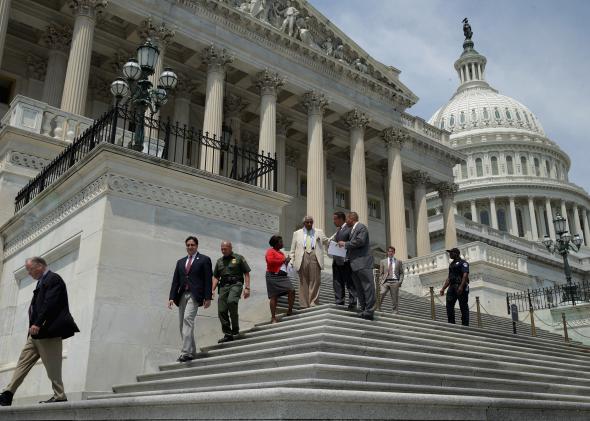There was precious little suspense about today’s House vote on an amendment to include funds for the training of Syrian rebels in the CR. The debate was heated, sure, but these debates are always slanted toward the people who want to talk. The pro-funding side was so confident that Illinois Rep. Adam Kinzinger, an Iraq veteran and leadership ally, took to the floor to mock the people who had not wanted this funding sooner.
“I don’t remember these colleagues stepping forward a month ago,” he said. “By many, I was called a warmonger or a guy who wanted to start a war in Iraq.”
Kinzger won his gloating rights when the House voted 273 to 156 for the Syria amendment. That number was not far off, actually, from the 296-133 vote twelve years ago that kicked off the Iraq War. But the Iraq War vote almost suceeded with the votes of Republicans alone, 214 of their 222 members voting “aye.” This time, only 159 Republicans voted for the funds, and 114 voted against them. Democrats were narrowly with the “no” side, splitting 85-71 against the funds.
So, who voted aye?
Everybody in competitive races. Georgia Rep. John Barrow, Minnesota Rep. Collin Peterson, and West Virginia Rep. Nick Rahall are among the very last Democrats in districts that voted for the Romney-Ryan ticket in 2012. They went “aye.” So did Iowa Rep. Bruce Braley and Michigan Rep. Gary Peters, both Senate candidates in tough races. On the Republican side, Senate candidates Tom Cotton and Steve Daines voted “aye,” as did Colorado Rep. Mike Coffman and Florida Rep. Steve Southerland. They’re the only two Republicans in seats that appear now to be toss-ups, with strong Democratic challengers cutting through the headwind.
Most Democratic leaders. The top three Democrats in the House – Nancy Pelosi, Steny Hoyer, and Jim Clyburn – were ayes, as was DNC Chairwoman Debbie Wasserman Schultz. The only leadership figure to break with the president was Maryland Rep. Chris Van Hollen.
Every Republican leader. From John Boehner to the deputy whip team, the GOP was on board.
Who voted no?
Most anti-Iraq War members. Most of the Democrats who were in the House for the 2002 Iraq vote were against that war. (The 2010 election cut down plenty of the pro-war Blue Dogs, who backed war then claimed to be fiscal conservatives. Strange.) Sixty of the 81 are still serving. Thirty-eight voted no; 22 voted “aye.” In general, the Democrats who won their seats by challenging the war in 2006 voted “no.” Maryland Rep. Donna Edwards, who won her seat by challenging a pro-war Democrat in two primaries, was also a no. Some outliers? New York Rep. Carolyn Maloney voted for the Iraq war and against this amendment; New York Rep. Joe Crowley voted for both.
